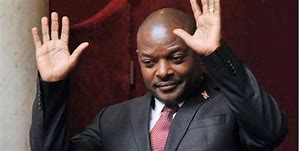Burundi president dies of illness suspected to be coronavirus





Burundi president dies of illness suspected to be coronavirus
The outgoing president of Burundi has died of a sudden illness, suspected by many to be Covid-19.
The cause of Pierre Nkurunziza’s death was described as a heart attack in a government statement. The 55-year-old was due to stand down in August following elections last month.
It was unclear exactly when he died. A government statement said the president, a keen sports enthusiast, had attended a game of volleyball on Saturday but fell ill that night and was taken to hospital.
The former footballer’s health improved on Sunday but “surprisingly, on morning of Monday June 8, 2020, his health suddenly deteriorated and he had a heart attack”. The statement described Nkurunziza’s death as “unexpected” and asked people to remain calm. Seven days of mourning have been announced.
Nkurunziza had refused to impose restrictions in the small and poor African country, allowing sporting events and mass political rallies to go ahead.
Speculation about the cause of his death has been fuelled by unconfirmed reports that his wife was flown to Nairobi, the Kenyan capital, 10 days ago after contracting Covid-19.
Authorities in Burundi have been accused of deliberately playing down the threat posed by the coronavirus pandemic, which has infected 197,000 people on the African continent and killed more than 5,000.
The nation of 11 million people has reported 83 cases of Covid-19 and officials have cited divine protection for Burundi’s ostensibly low infection rate and urged citizens to go about their daily lives without fear.
Nkurunziza’s spokesperson said that although the country may be hit by the pandemic, “Burundi … has signed a special covenant with God, whether you believe it or not”.
Burundi refused to follow most other African nations in imposing a lockdown and expelled the World Health Organization’s expert team working on coronavirus.
Nkurunziza was forced to step aside after 15 years in power by opponents within the country’s ruling CNDD-FDD party, but was to become “supreme guide” with wide if ill-defined power. As former leader he would have received a $500,000 (£410,000) gift from the nation along with a luxury villa.
The elections were won by Gen Évariste Ndayishimiye, who analysts say was selected because he was acceptable to a powerful clique of senior military officers. The opposition claimed the poll had been rigged. Rights groups accused the ruling party and its youth wing of systematically crushing dissent.
Between January and March, Ligue Iteka, an exiled Burundian human rights organisation, documented 67 killings, including 14 extrajudicial executions, six disappearances, 15 cases of gender-based violence, 23 cases of torture, and 204 arbitrary arrests. There was also some violence directed against ruling party members and youths – including killings – but at much lower levels.
Burundi became diplomatically isolated after 2015, when Nkurunziza’s decision to run for a third term – a move his opponents said violated the peace deal that ended the civil war – sparked protests met with extreme violence by the youth wing of the ruling party, known as the Imbonerakure, and the security forces. Hundreds of thousands of Burundians fled into exile.
Burundi withdrew from the international criminal court in 2017 and shut down the United Nations office on human rights last year.
“As I learn of the passing of Pierre Nkurunziza, I think of the thousands of lives that his regime cut short. The families that won’t see justice,” tweeted Thierry Uwamahoro, a democracy activist and prominent government critic who lives in exile.
Journalists and human rights workers in Burundi are routinely targeted. Last week, four journalists from the domestic news website Iwacu were sentenced to two and a half years in prison after they travelled to investigate reports of unrest in the north-west of the country.
Reference: The Guardian:Jason Burke Africa correspondent: 9 June 2020
Articles-Popular
- Main
- Contact Us
- Planetary Existences-2
- Planetary Existences
- TWO REVELATIONS-2
- Jeffery Epstein - The Saga - 9
- Jeffery Epstein - The Saga - 8
- Jeffery Epstein - The Saga - 10
- The Two Revelations
- The Fourth Way - Study of Oneself - P.D.Ouspensky
- Impeachment Investigators Subpoena White House - Ukraine
- Universality of Initiation
- Initiation and the Devas
- The Path Of Initiation
- The Participants In The Mysteries-2
- The Fourth Way - Wrong Functions - P.D Ouspensky
- The Final Initiation
- Statues are a mark of honour. Like Edward Colston, Cecil Rhodes and Oliver Cromwell have to go
- Discipleship - Group Relations - 2
- The Probationary Path - 2
- The Participants In The Mysteries
- Discipleship - Group Relationships
- Discipleship
- The Succeeding Two Initiations
- Jeffery Epstein - The Saga - 7
- Jeffery Epstein - The Saga - 6
Articles - Latest
- They Lied to Us! The Truth They Hid About Hitler’s Death — Gerard Williams
- Ramaposa Dragged Out of Parliament
- Madagascar Goverment Collapse
- The Reality of Digital Id
- Welcome To The End Of Western Dominance
- Why is the Sahel turning its back on France?
- Sarkozy gets 5 years in prison in Gadhafi case
- The EU in 2025: A union at the crossroads of chaos
- Deep distrust of EU leaves Italy's Meloni in a corner over bailout fund
- Regime crisis in France: Bayrou falls, now Macron must go!
- Idi Amin president of Uganda
- Anger at Starmer's 'surrender deal' that hands Spain control over Gibraltar border
- Iran doubles down as US signals Israel could strike during nuclear talks
- What could have caused Air India plane to crash in 30 seconds?
- WW3 fears explode as Britain now Russia's 'enemy number 1' - even ahead of Ukraine





